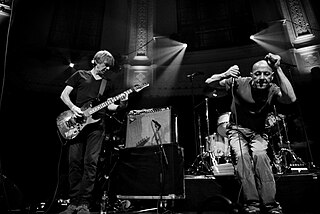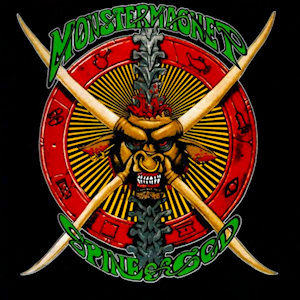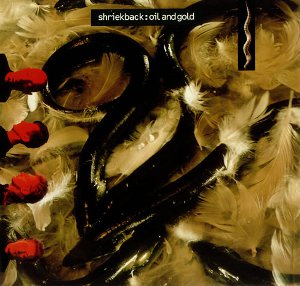
Congregation is the third studio album by American alternative rock band The Afghan Whigs. It was released on January 31, 1992, by Sub Pop and followed two years of the band's touring in support of their first album for the label, Up in It (1990).

Barry Andrews is an English songwriter, singer and keyboard player who is a co-founder of Shriekback and was formerly a member of XTC and the League of Gentlemen.

Shriekback are an English rock band formed in 1981 in Kentish Town by Barry Andrews, formerly of XTC and the League of Gentlemen (keyboards/synthesizers/vocals), and Dave Allen, formerly of Gang of Four, with Carl Marsh, formerly of Out on Blue Six (guitars/vocals) soon added to the line-up. The band's early music was a funk-influenced version of new wave and post-punk, later moving towards art rock and always featuring "insidiously weird vocals".

Spine of God is the debut studio album by American rock band Monster Magnet, released in Europe in 1991 and in the United States the following year. The album represents one of the earliest examples of the emerging 1990s sub-genre of stoner rock. Spine of God did not perform well commercially upon its initial release, but was praised by critics and would later be considered a major influence on stoner rock bands. The song "Medicine" was released as a single with accompanying music video.

Hugo Hamilton Mark Burnham is an English musician, and drummer for the rock group Gang of Four.

Care is the first full-length Shriekback album, released in 1983.

Jam Science is the third studio album by English pop group Shriekback. It was released in two versions in 1984 and was reissued on CD in a two-disc special release from the band themselves in 2014, the second disc being a live show at Hatfield.

Oil and Gold is the fourth studio album by the English rock band Shriekback, released in 1985 by Arista Records in UK and Europe, Australia and New Zealand and by Island Records in the United States,

Big Night Music is a studio album by the English band Shriekback, released in 1986. It spent six weeks on the Billboard album chart, peaking at number 145. With the departure of Carl Marsh, Barry Andrews took over as the band's frontman. Remaining original member Dave Allen left the band following the release of the album.

Go Bang! is the sixth studio album by the English rock band Shriekback, released in 1988. It produced a significant number of Billboard modern rock hits, including "Get Down Tonight," "Intoxication," and "Shark Walk". Released after the departure of founding member and bassist, Dave Allen, the album revolves around Barry Andrews.

Naked Apes and Pond Life is the eighth full-length album by Shriekback. The 2000 release was a surprise resurfacing for the band, after many years of quiet. It gathered many songs performed in intimate appearances in London over the preceding years, recorded in the studio by Barry Andrews, Martyn Barker, Lu Edmonds, as well as Simon Edwards and Mark Raudva.

What Up, Dog? is the third studio album by Was. It became the group's breakthrough album worldwide and was ranked #99 on the Rolling Stone magazine's list of the 100 Best Albums of the 1980s. The cover illustration was credited to Christoph Simon and Karen Kelly.

My Sister's Machine was an American rock band from Seattle, Washington, formed in 1989. Its members were Nick Pollock, Owen Wright (guitar), Chris Ivanovich, and Chris Gohde (drums).
King Swamp was a British rock band, consisting of Walter Wray (vocals), Dave Allen (bass), Steve Halliwell (keyboards), Dominic Miller (guitar), and Martyn Barker (drums). The band was formed in 1988 in London, after Allen and Barker had parted ways with Shriekback and recruited Wray as frontman. Halliwell and Mike Cozzi were also ex-Shriekback members.

Tales is an album by the American musician Marcus Miller, released in 1995. He supported it with a North American tour.

Philip Joseph Alvin is an American singer and guitarist known primarily as the leader of the rock band The Blasters. His voice has been described as "robust...powerful...rich, resonant, [and] supremely confident."

Weak is an album by the American band Seaweed, released in 1992 on Sub Pop Records. At the time of the album's release, Seaweed was the youngest band on the Sub Pop roster.

Live! You Goddamned Son of a Bitch is a concert album and video by the Revolting Cocks, consisting of live material recorded at the Cabaret Metro in Chicago, on September 4, 1987. However, Al Jourgensen has claimed in his autobiography, that the whole concert was re-recorded in Trax studio in Chicago afterwards. According to Jourgensen both Paul Barker and Chris Connelly thought the live record sounded horrible and they refused to release the original audio recording of the show. Jourgensen thought the recording was perfect but later agreed with Barker and Connelly. It is their second LP release following Big Sexy Land.

Rhythm Killers is an album by Jamaican musical duo Sly and Robbie, released in May 1987 by Island Records. By the time of the album's recording, Sly and Robbie had transitioned away from their prolific work in the reggae genre. They spent the 1980s experimenting with electronic sounds and contemporary recording technology on international, cross-genre endeavors, which influenced their direction for Rhythm Killers.

Back is the final studio album by the American band Ohio Players, released in 1988. The first single was "Sweat". It was Ohio Players' only album for Track Record Company.



















